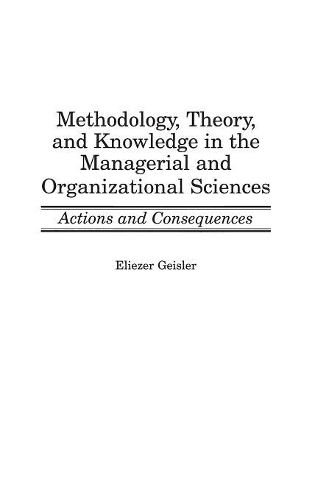
Methodology, Theory, and Knowledge in the Managerial and Organizational Sciences: Actions and Consequences
(Hardback)
Publishing Details
Methodology, Theory, and Knowledge in the Managerial and Organizational Sciences: Actions and Consequences
By (Author) Eliezer Geisler
Bloomsbury Publishing PLC
Praeger Publishers Inc
30th June 1999
United States
Classifications
Tertiary Education
Non Fiction
658.001
Physical Properties
Hardback
248
Description
Geisler argues that the over-reliance on co-variation techniques and statistical methods, instead of process approach and in-depth analysis, produces meaningless knowledge in the managerial and organizational sciences, and indeed throughout all the social sciences. He offers instead a new and different approach, based on the notion of what he calls dynamic morphologiesan architecture of slicing complex phenomena. This way it is possible to explain many inconsistencies in research findings, and to find a cohesive, systematic outlook on research, research design, and knowledge creation. Intellectually challenging and following in the footsteps of Kuhn, Argyris, and Popper, Geisler's approach is frankly revolutionary in research design and contains its own notions, terms, and nomenclature. A provocative discussion for academics and others well trained in the organizational, managerial, and social sciences. Geisler's dynamic morphologies provide a means to research complex phenomena and gain knowledge about them. They are composed of a chain of events, combined logically and temporally, and a method by which this process is studied. Geisler also contends that knowledge in the organizational and managerial sciences is only viable when it describes and explains the complex, higher-order phenomena. Therefore, theory building and research in these fields must be linked to higher-order constructs and the phenomena that they attempt to explain. This is the central notion of amplitude that Geisler introduces and describes. His book also criticizes the evolutionary epistemology view of knowledge creation and contends that knowledge in all of these fields of study in general is not evolutionary, but instead, cumulative and expansive.
Author Bio
ELIEZER GEISLER is Professor of Organizational Behavior at the Stuart School of Business at the Illinois Institute of Technology. With a doctorate from Northwestern's Kellogg Graduate School of Management, he was associate editor of the IEEE Transactions on Engineering Management and is the editor of special publication for the International Journal of Technology Management. He also edits a book series on the management of medical technology and is author of more than 50 scholarly publications in the fields of technology and innovation management. Among his earlier books is Managing the Aftermath of Radical Corporate Change (Quorum, 1997).
